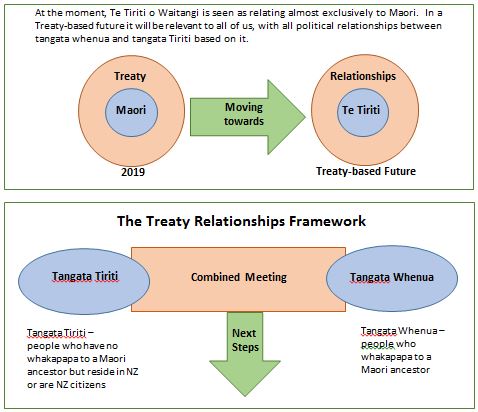We focus on what was happening both globally and locally in the period leading up to the signing of the Treaty and also on the importance of its five aspects – the Preamble and four Articles:
Preamble: Peace with justice for all
Article 1: Practising honourable KAWANATANGA
Article 2: Promoting TINO RANGATIRATANGA by tangata whenua
Article 3: Maori participation in Kawanatanga in ways determined by Maori in relation to tikanga
Article 4: Everybody’s belief systems upheld
All 5 aspects of the Treaty need to be taken together as a whole and as a follow-on to the 1835 Declaration of Independence – He Wakaputanga o te Rangatiratanga o Nu Tireni.
This work supports the kaupapa of the restoration of Tino Rangatiratanga by Maori and the establishment of honourable Kawanatanga by the Crown. It is placed-based and values-based and relies on considering what really matters to us all for the future.
Development based on The Treaty cannot be substituted by:
- Equal/equitable development
- Culture, cultural differences, cultural safety and intercultural development
- Biculturalism or bicultural development
- Understanding history and colonisation alone
- Treaty “settlements”
- Any of the several sets of Principles of the Treaty e.g. Partnership, Protection and Participation as well as the Waitangi Tribunal’s latest two
- The so-called English Version of The Treaty (which was not present at Waitangi on 6 February 1840)
Through developing this understanding of Te Tiriti o Waitangi we can assist in the process of working toward a Treaty-based, multicultural future.

The quote ‘He iwi kotahi tatou’, meaning ‘now we are one people’, from Captain William Hobson who signed Te Tiriti on behalf of
the British Crown, was put in context in a speech by Dr Pita Sharples in Wellington, 17 August 2006. Dr Sharples explained:
“As Nelson Mandela had said, ‘It is difficult to negotiate with those who do not share the same frame of reference’. If we are able to recognise and come to have a shared view of this political document called the Treaty of Waitangi, as our shared frame of reference, then and only then, can we perhaps say – He iwi kotahi tatou”.

